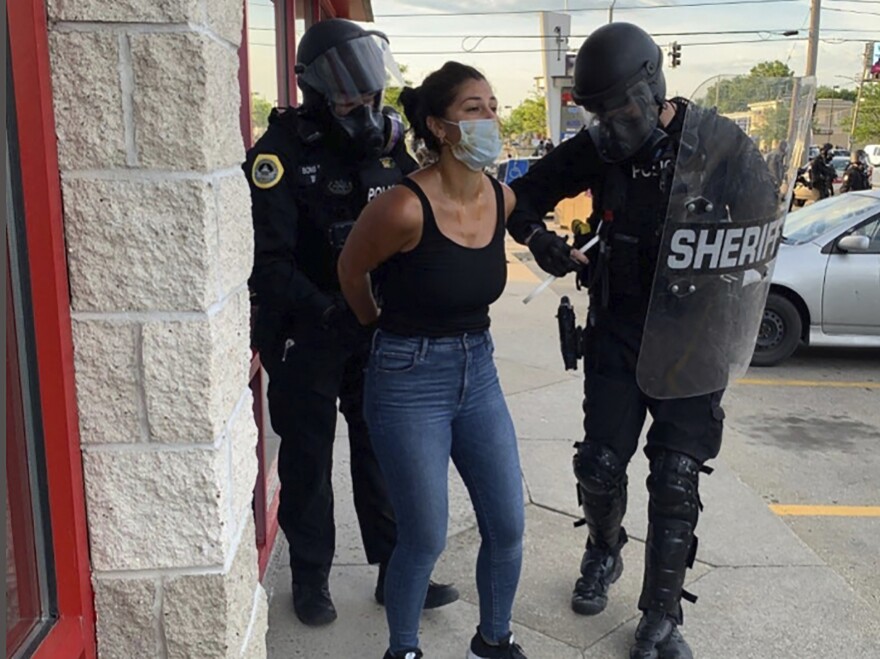An Iowa newspaper reporter arrested as she covered a Black Lives Matter protest last spring goes on trial Monday in a case that has drawn international concern over press freedom.
The Des Moines Register reporter, Andrea Sahouri, was arrested on May 31 as protesters clashed with police during a demonstration near a shopping mall in the Iowa capital.
Sahouri's then-boyfriend, Spenser Robnett, accompanied her for "safety reasons," the Register says.
Despite repeatedly identifying herself as "press," police deliberately pepper sprayed her and then zip-tied her for arrest, she said. Sahouri and Robnett were later charged with failure to disperse and interfering with official acts, misdemeanors that could carry fines and up to 30 days in jail.
In video taken by local television station KCCI, a masked Sahouri and another person, presumably Robnett, are shown seated on the pavement in front of a storefront with their hands secured behind their backs.
Shortly after her arrest, Sahouri posted a video of her own, posted to Twitter from inside a police vehicle. In it, she recounts the incident, saying she was "just reporting" when she was taken into custody.
In the video, she says Robnett was hit by a teargas canister. "As I was seeing if his leg was O.K., police came closer and we went around the corner and I was saying, 'I'm press. I'm press. I'm press,'" Sahouri said.
Des Moines police and John Sarcone, the attorney for Polk County, contend that at the time of her arrest, Sahouri wasn't wearing any media credentials and appeared to be participating in an unlawful assembly. Police had issued an order to disperse about 90 minutes before, according to the Register.
The Associated Press reports that the newspaper's executive editor, Carol Hunter, has acknowledged that Sahouri was not wearing a press badge, which she said had been left in the reporter's car. Hunter called it a "red herring," saying the police immediately knew Sahouri is a journalist and that carrying press credentials is not necessary to enjoy Constitutional protections.
"Freedom of the press rests on newsgathering," Hunter said, according to the AP. "This really is an attack on a fundamental part of being able to bring people the news."
On Friday, prosecutor Bradley Kinkade argued at a pretrial hearing that Sahouri being a journalist "is irrelevant to her charges."
"This is a standard misdemeanor trial," he told the court, as the Register reported.
However, the Iowa Freedom of Information Council said that "All Iowans should be troubled by this abuse of prosecutorial discretion."
"The Founding Fathers wrote the First Amendment for this very purpose — to allow the media to scrutinize the actions of law officers," the Council said in a statement.
Amnesty International has also weighed in on Sahouri's case, saying that "treating media work as a crime is a human rights violation."
In a statement sent to NPR, Erika Guevara-Rosas, Americas director at Amnesty International, said the charges against Sahouri "represent a clear violation of press freedom and fit a disturbing pattern of abuses against journalists by police in the USA."
"It's deeply troubling that the prosecutor would push these bogus charges all the way to trial," Guevara-Rosas said.
The U.S. Press Freedom Tracker reports that 127 journalists were arrested in 2020 – the vast majority at protests. That compares to just nine such arrests the previous year. It says Sahouri is among 13 journalists who currently face criminal charges.
The Register reports that at the start of the trial on Monday, the judge rejected a motion to dismiss the charges against Sahouri and that jury selection was underway.
Prosecutors may try to bring up text messages they obtained that were exchanged between Sahouri and a protest leader, Matè Muhammad, about a week after her arrest.
Muhammad — who has been charged with shining a laser pointer in the eyes of police during an August BLM protest — says he and Sahouri struck up a professional relationship following her arrest. He was quoted by the AP as saying, "We enjoy working with her not because we view her as an activist or on our side, but because we view her as fair."
Copyright 2021 NPR. To see more, visit https://www.npr.org.


